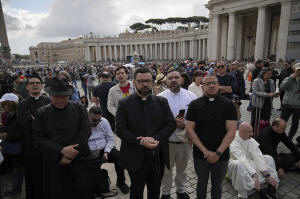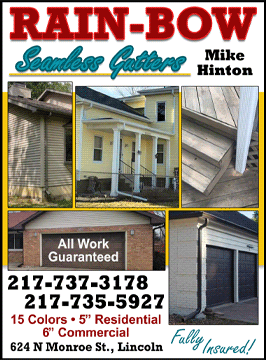No new pope elected yet after black smoke pours out of Sistine Chapel's
chimney
[May 08, 2025]
By NICOLE WINFIELD
VATICAN CITY (AP) — Cardinals failed again Thursday morning to find a
successor to Pope Francis, sending black smoke billowing up through the
Sistine Chapel chimney after two more inconclusive rounds of conclave
voting.
The black smoke poured out at 11:50 a.m. (0950 GMT) after the second and
third ballots to elect a pope to lead the 1.4 billion-member Catholic
Church.
With no one securing the necessary two-thirds majority, or 89 votes, the
133 cardinals will return to the Vatican residences where they are being
sequestered. They will have lunch and then return to the Sistine Chapel
for the afternoon voting session. Two more votes are possible Thursday.
The cardinals had returned to the Sistine Chapel on Thursday to resume
voting for a new pope and crowds flocked back to St. Peter's Square to
await their decision, after the first conclave ballot failed to find a
winner during a longer-than-expected voting session Wednesday afternoon.
The billowing black smoke poured out of the chapel chimney just after 9
p.m. Wednesday (1900 GMT), about 4½ hours after the cardinals filed into
the chapel. That prompted speculation about what took so long for the
133 electors to cast and count their ballots.
Hypotheses abound: Did they have to redo the vote? Did someone get sick
or need translation help? Did the papal preacher take a long time to
deliver his meditation before the voting began?
“They probably need more time,” said Costanza Ranaldi, a 63-year-old who
traveled from Pescara in Italy’s Abruzzo region to the Vatican.

Some of the 133 voting cardinals had said they expected a short conclave
to replace Pope Francis. But it will likely take a few rounds of voting
for one man to secure the two-thirds majority, or 89 ballots, necessary
to become the 267th pope.
For much of the past century, the conclave has needed between three and
14 ballots to find a pope. John Paul I — the pope who reigned for 33
days in 1978 — was elected on the fourth ballot. His successor, John
Paul II, needed eight. Francis was elected on the fifth in 2013.
The cardinals opened the secretive, centuries-old ritual Wednesday
afternoon, participating in a rite more theatrical than even Hollywood
could create.
[to top of second column]
|

People at St. Peter's square wait to see smoke pour from the chimney
of the Sistine Chapel where 133 cardinals are gathering on the
second day of the conclave to elect a successor to late Pope
Francis, at the Vatican, Thursday, May 8, 2025 (AP Photo/Alessandra
Tarantino)

Cardinal Pietro Parolin, the 70-year-old secretary of state under
Francis and a leading contender to succeed him as pope, assumed
leadership of the proceedings as the most senior cardinal under age
80 eligible to participate.
Outside in St. Peter’s Square, the atmosphere was festive as
thousands of people flocked to the piazza to watch the proceedings
on giant video screens, applauding when the Sistine Chapel’s doors
slammed shut and the voting began.
They waited for hours, watching screens that showed just a skinny
chimney and occasional seagull. After the vote dragged on to
dinnertime, some left in frustration, but those who stayed cheered
when the smoke finally billowed out.
“My hope is that cardinals will choose a man who can be a peacemaker
and could reunify the church,” said Gabriel Capry, a 27-year-old
from London.
The cardinals were sequestered from the outside world, their
cellphones surrendered and airwaves around the Vatican jammed to
prevent all communications until they find a new pope.
Francis named 108 of the 133 “princes of the church,” choosing many
pastors in his image from far-flung countries like Mongolia, Sweden
and Tonga that had never had a cardinal before.
His decision to surpass the usual limit of 120 cardinal electors has
both lengthened the amount of time it takes for each vote to be
processed and injected more uncertainty into a process that is
always full of mystery and suspense.
___
Giada Zampano and Vanessa Gera contributed to this report.
All contents © copyright 2025 Associated Press. All rights reserved |